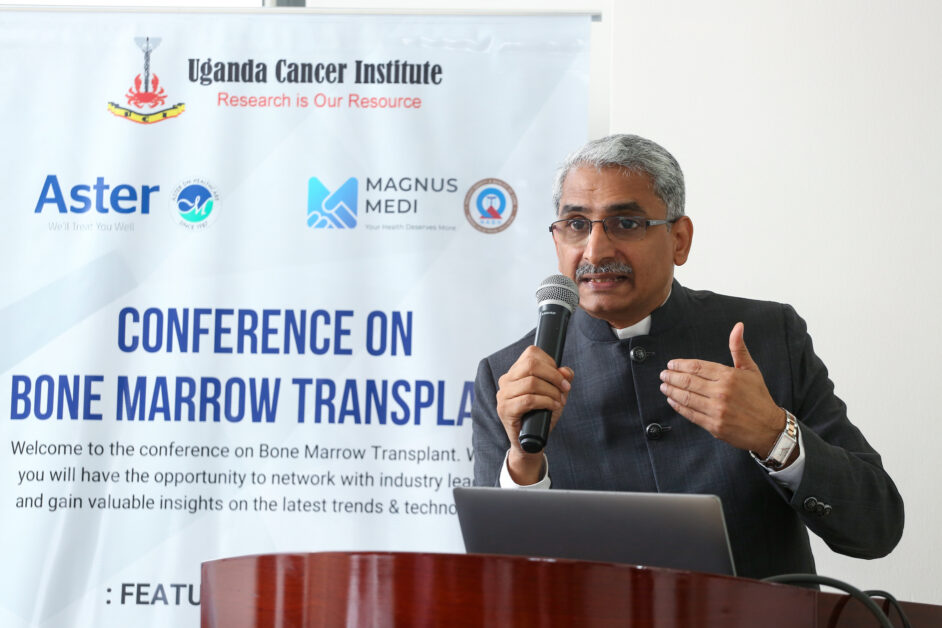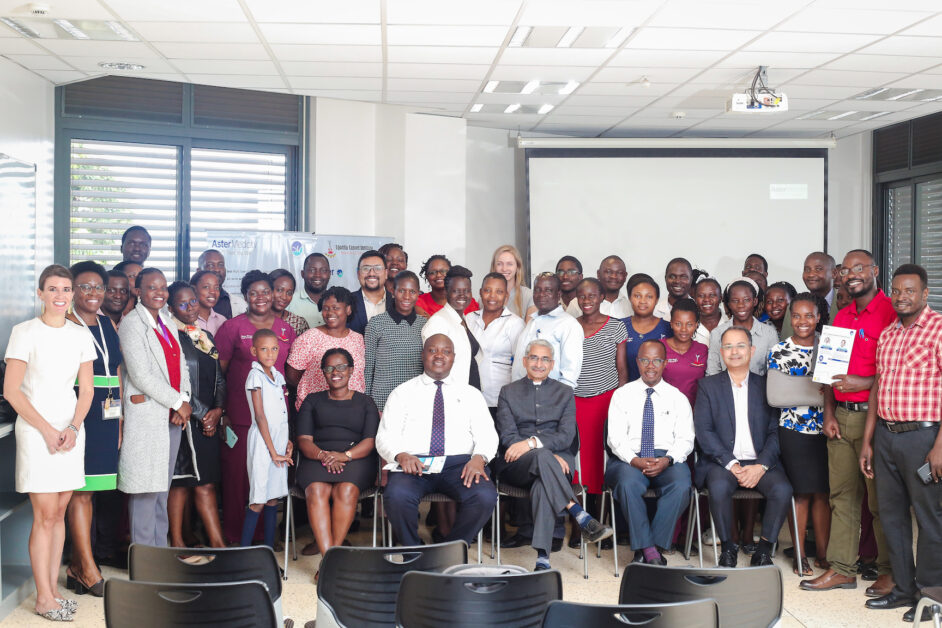Aster Medcity, one of South India’s largest quaternary care healthcare centres; Magnus Medi , one of the leading brands in India’s medical tourism industry and the Uganda Cancer Institute, have successfully concluded the first bone-marrow transplant conference with a commitment to enhancing collaboration and knowledge exchange in the highly specialised field.
The conference, held at the UCI-Fred Hutch Cancer Centre, attracted doctors, nurses, laboratory technicians, researchers and students attached to the Uganda Cancer Institute. The conference is one of the very many initiatives envisaged under an in-the-works academic exchange and collaboration programme between UCI, Aster Medcity and Magnus Medi.
Dr. Ramaswamy N. V a Senior Consultant – Hematology and Hemato Oncology and the Director Hemotologist at Aster Medcity, presented to stakeholders on the latest trends & technologies in bone marrow transplant.
He underscored the need for closer collaboration between African and Asian countries on key elements such as research, knowledge exchange and increasing the pool of stem cell donors, saying that the two continents were lagging behind other continents such as North America and Europe.

Dr. Ramaswamy who holds more than two decades of experience, in the management of malignant and non-malignant diseases of the blood, in patients of all ages also answered various questions fielded by the various UCI healthcare professionals.
The tripartite bone-marrow conference follows a knowledge exchange visit by UCI staff to Aster Medcity in February 2022. The UCI delegation was led by Dr Henry Ddungu, the Head, Division of Medical Oncology and Haematology and facilitated by Mr. Mihir Vora Founder & CEO of Magnus Medi.
The academic exchange and collaboration programme being discussed by the three entities will see collaboration and capacity-building efforts to improve healthcare, especially in oncology in Uganda. The partnership among others, covers, staff skilling, and personnel exchange between the two institutions and collaboration for health care in oncology leading to improved medical services and clinical care of capacity building in Uganda.
Areas of cooperation include:
- Training of medical doctors, nurses, technicians and other health care professionals
- Visiting consultants/experts/advisors
- Exchange of faculty members/academic staff
- Exchange of staff
- Exchange of post-graduate trainee/fellows
- Other mutually benefit projects like joint conferences, clinical or research collaborations etc.
Ultimately, the partnership will culminate in Aster Medcity Hospital And Magnus Medi assisting the Uganda Cancer Institute in putting up its own Bone-Marrow Transplant unit, which will save many Ugandans from travelling abroad.
Widening bone marrow transplant access for Uganda and the region
Speaking at the conference, Dr. Nixon Niyonzima, the Head of the Department of Research and Training at UCI said the conference was within UCI’s strategic vision of shaping itself into an internationally recognised centre of excellence in advancing comprehensive cancer management in Africa.

“Our goal here is to enable access (to bone-marrow transplant for more patients. Remember bone-marrow transplantation is not just for just cancer patients; it’s also applicable to many other benign haematology conditions, such as sickle cell disease, plastic anaemia, and a number of other diseases that currently have no cure,” Dr. Niyonzima said.
He added that the expensive treatment options, only available out of the country were limiting access to the life-saving procedure and therefore such knowledge exchange programmes such as with Aster Medcity and Magnus Medi were vital to widening access to bone-marrow transplant in the near future.
“On average it takes up to USD 20000 – 50000 to get a bone marrow transplant out of Uganda. That means that less than 0.1% of all Ugandans are going to be able to access bone-marrow transplants,” he said.
He however added that with the support from the Government of Uganda and other partners, UCI was in the advanced stages of putting up a bone-marrow transplant centre.
“We have started construction of a transplant facility funded by the African Development Bank, and we hope that within three years, we will be able to make the first patient begin on the first steps towards the first transplant in Uganda,” he said.
He also said that beyond the construction, other efforts were being made to prepare UCI for this momentous milestone.
“Dr. Ddungu, led a team that went to Aster City to attend some training, and from the time they came back, we have already started apheresis here at Uganda Cancer Institute,” he said.

Apheresis is the process of collecting stem cells from the blood.
“We’re making strides in this aspect, but it’s a continuous process. It is not a one-day thing,” Dr Niyonzima added.
Dr. Niyonzima said, beyond cancer, UCI was looking to expand bone-marrow transplants to treat other sicknesses.
“In Africa, 1 in every 12 patients is a carrier of the sickle cell trait, meaning that we have very many patients with sickle cell disease. And for many of these, they die before their 20th birthday. We want to create treatment options for patients with plastic anaemia, multiple myeloma, leukaemia etc, here at Uganda Cancer Institute. In addition, since we are creating UCI into an international Centre of Excellence, we also want to offer options to other residents of the East African region and SubSaharan Africa. So partnerships such as this are what will enable us to build that capacity here in Uganda,” Niyonzima reiterated.
On his part, Dr. Ddungu UCI had already identified a team of expert⏤ doctors, nurses, laboratory technicians etc, who are undergoing a series of training and a comprehensive plan for establishing an international standard BMT centre had already been formatted. He also said that even when the transplants start in Uganda, collaborations with other centres of excellence like Aster Medcity will remain relevant.
“Even as we start, we may not be able to achieve everything. For example, we won’t be able to run haploidentical and islet transplants. This is where such collaborations with Aster Medcity will come in handy, to handle complex cases. But all in all, we are committed to reducing the number of people that go out for treatment. We don’t want to be an institution that exports patients. We need collaborators that can help us grow capacity and make sure that we set up our own programmes,” he said.
